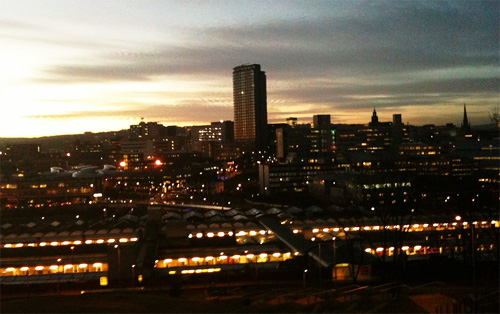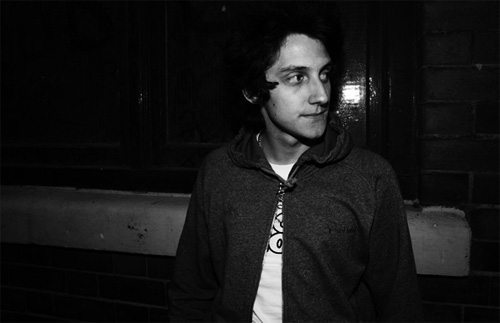Rarely can you go a week in the music industry without hearing of a new club, residency or ‘essential’ night in London, Manchester or Leeds. Sheffield, not so much, but that’s not to say that there’s a lack of musical activity or talent hailing from there; quite the opposite in fact. So why has it flown relatively under the radar for so long? Defected’s Ben Lovett asks the question…
“Sheffield has a real resilience about it; it is backs against the wall-type stuff...there’s no Manchester magic here, only the real determination to get on with the job, and make something happen” so says Stephen ‘Mal’ Mallinder, former member of the city’s legendary electronic band Cabaret Voltaire.
This geographical mindset perhaps best explains why ‘City of Steel’ Sheffield has always remained relatively hidden when club historians debate Britain’s revolutionary electronic past. “Sheffield music has always come in fits and starts, possibly due to an unfortunate combination of small and bloody mindedness amongst its inhabitants” institutional city DJ-producer Richard ‘Parrot’ Barratt explains. “Yes, generally speaking Sheffield is a small city and its people have always had a mentality to protect what they have...batten down the hatches” Pipes, another of Sheffield’s cult, long-term protagonists, adds. “As such we probably haven’t been all that great at promoting ourselves over the years. There’s a certain harshness that comes through in what the city produces musically; the people here have always been wary of outside influences. Historically, the city has always been hemmed in.”
At the same time the music media haven’t helped matters, Chris Duckenfield suggests. The seasoned Sheffield DJ-producer behind such aliases as Swag, Astrix & Space and, most latterly, The Popular People’s Front claims that poor editorial standards and the influence of advertising budgets have, over the years, ensured certain corners of clubland generate more interest and coverage than others. “I think the fact that Sheffield has had less attention [than London, Manchester and Leeds]...that’s probably more about lazy journalists and ‘full page ad equals favourable editorial’ shenanigans at the large dance music magazines in the pre-internet era. The great pulsating blob of information we can now all tap into means the traditional drivers of influence and exposure have changed beyond recognition.”
One feels that Sheffield’s sonic exploits are truly on the map today, through everyone from pop-rock mainstreamers Arctic Monkeys to underground beatsmith Todda T. Regardless, Pipes feels the city has always had something about it. “It’s as sharp as it’s ever been” he affirms. “There have always been people making good, experimental music here. The city has constantly been involved in house and disco; you had those great clubs in the Eighties like Jive Turkey. And then there was all that second wave, post-industrial sound from bands like Cabaret Voltaire; and more recently groundbreaking nights like Kabal. Younger acts like Toddla T, I’ve known him for years now and he’s carrying on the city’s rich traditions. Beyond him, there’s a whole new wave of people like Squarehead (AKA Oliver Ledger), extending this amazing lineage. I’ve been influenced by all of it; it’s in my blood.”
The Sheffield of the Sixties and Seventies was synonymous with a thriving blues and soul scene, which evolved into several predominantly black-driven street soundsystems, as well as a hugely experimental electronic community, spearheaded by Cabaret Voltaire. “I grew up in Pitsmoor, which was a really mixed, inner city area, so music was everywhere and everything really” Duckenfield reflects. “’All Dayer’ events when I was a teenager were a big, big deal for me, breakdancing crews and DJ battles – the kind of co-opting of what had happened so dramatically in New York was an incredible and totally absorbing part of my youth and provided an instant, vibrant culture where there really wasn’t one before.”

Parrot’s DJ debut in 1985, via his own night Jive Turkey at Mona Lisa’s (alongside Winston Hazel), was a major reflection of Sheffield’s rapid evolution. Parrot would play everything from Northern Soul – aping Sheffield’s past – to the latest Cabs records, taking in electro, early hip-hop and anything else rhythmically experimental along the way. On occasion, the party would move to other venues in the city (sometimes billed as Club Superman) but its loyal following continued to grow. Jive Turkey would, subsequently, nurture the rise of house music in Sheffield.
“The young black crowd and the electronic music community took to house music straight away. A pattern that was repeated all across the North and Midlands” Parrot offers. “Jive Turkey didn’t have quite the same troubles with drugs and police that venues like the Hacienda had either. We weren’t part of that big outdoor rave thing; more clubs and small spaces that the police weren’t too interested in.”
In line with that simple philosophy, Sheffield promoters and DJs tended to keep their heads down and musical cards close. “The city tended to ignore the big Hacienda records” Pipes indicates. “There’s a lot of homogeny in clubland these days but back then Sheffield stuck to its guns. The city had a really specific identity, ignoring some of the big outside trends, and concentrating on certain records. The Sheffield DJs didn’t actual travel that much either... the local community was strong...which obviously had its drawbacks in terms of us being able to make a bigger noise but did allow us to concentrate on doing our thing.”
Jive Turkey, for a time, was able to hold on to its successful dancefloor formula. “For a couple of years we had a really good mix of people” Parrot says. “The older crowd were coming back from Ibiza...but the black crowd was still there as well. We were playing music to the old crowd, but we’d got the energy of the ‘E’ people in there as well. In a lot of other places like Manchester it changed very quickly.”
Ultimately, the rise of ecstasy (and the black market around it) and reactive government legislation would impact Sheffield too. The city’s soundtrack had already changed to the brasher, more aggressive, hi-NRG strains of Euro house and techno. Parrot decided to call the DJing a day: “I couldn’t stand to play those records so I packed it in.”
The Nineties saw Sheffield, like many other cities, embracing glam superclub culture and the idolising cult of DJ: “Me and Pipes did visit Gatecrasher [the super-venue launched in Sheffield during the mid-Nineties] one night, because Phil Oakey [Human League frontman] kept telling us how good it was. That’s the first time I ever saw a crowd all facing the DJ, seemingly treading water in between each humongous breakdown. We didn’t go again.”
Duckenfield retains an optimistic view of the period: “It was a mixed blessing but Gatecrasher, like it or not, convinced many people that Sheffield was a happening city.” This momentum of popular opinion complimented the rise of several new local scenes in the following decade. “We had the genre-defining Niche scene [a UK epicentre for bassline music, as typified by artists including Zed Bias], the Drum & Bass Arena and Kabal’s incredible underground events...home to Winston, Pipes and Toddla” he states. “It’s easy to understate how important the global success of the Arctic Monkeys has been too [the Sheffield band formed in 2002]. That whole process made a lot of Sheffielders realise that the sky’s the limit, given some talent and graft.”
Of more recent times, Toddla T’s story is particularly compelling. The ties between Sheffield and the music-makers it breeds have never been tighter. “I’ve been around the world and Sheffield remains the absolute best place” he buzzes. “I moved with to London with my family two years ago and seriously worried about leaving but the city is deep within me, deep within my sound. I first properly got involved with music there when I was 7, was making mixtapes when I was 14 and after that started fully appreciating the local scene and its history. I’d hang out with Winston and Pipes and eventually we’d throw these amazing Kabal parties. The atmosphere was totally unique; it’s still unique now. You’ve got the boys in there, the girls, a massive mix of music... techno next to reggae...all under one warehouse roof...it all makes so much sense.”

T is renowned for reppin’ his roots on record and in interview time and time again; how does he explain the close affiliation? “I think working with so many great DJs and producers – I haven’t even mentioned Mark Brydon [Moloko] or Ross Orton [Arctic Monkeys] – with these amazing visions...the amalgamation of all of that has just stuck with me” he explains. “I wanted to be these guys when I was growing up; their work ethos rubbed off on me 100%. The Sheffield they’ve helped build is so effortlessly next level; even the older stuff still sounds fresh.”
He continues: “You have to remember that Sheffield had nothing in the early days, which left an open blueprint for people wanting to make music. That DIY ethos has carried through, and encouraged forward-thinking in the studio. Combine that with Sheffield’s no-wank attitude and you have something really special. Sheffield has never been in any trend’s pocket, or suffered the gas ‘n’ chat you get with some DJs and producers. I’ve spent years with Pipes so when he says something is good you know it is - no bullshit, just compelling honesty.”
Which also comes across in his assessment of the city’s future prospects: “The future is wicked man. That 18-25-year-old generation behind me has a lot of potential. People like Melody, Alter Ego and Squarehead have a strong club perspective; they’re wicked young ‘uns.” Duckenfield concurs; keen also to flag the increasing use of Sheffield’s once hidden warehouses as “crucibles for musical change” as well as the ongoing legacy of world famous Sheffield label Warp. “It’s at Warp I cut my teeth as a ‘proper’ DJ and enjoyed my first forays into the studio. I owe it everything! They’re still easily one of the most interesting indie labels on the planet. Flying Lotus, Grizzly Bear, Battles – it’s the same spirit of championing mavericks they’ve always had.”
Similarly, Sheffield’s own steely spirit is set to shine on and on....
Words: Ben Lovett
Crooked Love is out now on Defected Records – buy from Beatport



